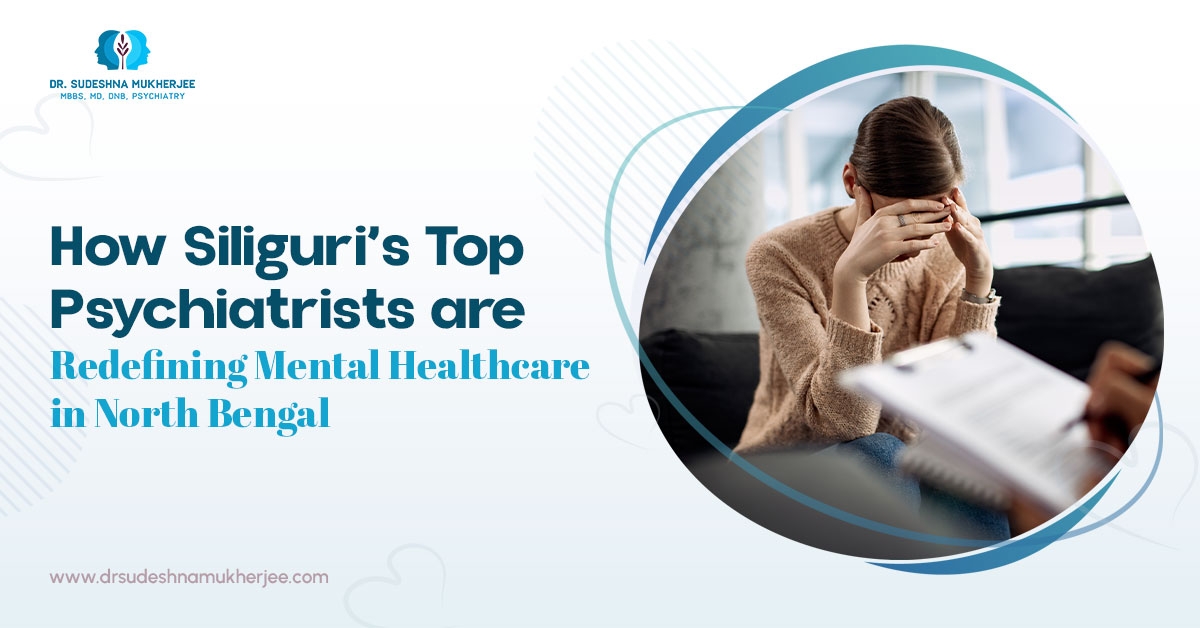Choosing to consult a psychiatrist has always been a wise step and decision. If this is your first time seeing a psychiatrist, you should know that many people are visiting their doctor for the first time for their well-being. This blog will share how to prepare, what to anticipate during the session, and how to follow up.
This guidance makes youcomfortable, confident, and prepared to get the most out of your session at the end. You may receive expert advice and support from the best psychiatrist doctor in Siliguri City.
Your mind may be clouded by questions such as "What will the doctor ask me?" "Do I really need medication?" and "What if people find out?" Actually, though, your first visit to a psychiatrist is not anything to be feared; rather, it is a chance to learn more about yourself and receive expert advice on how you maystrengthen your mental and emotional health.
Why Visit a Psychiatrist in Siliguri?
Understanding the reasons behind people's decisions to see a psychiatrist is very important before delving into the initial visit experience. Mental health issues are common, which can be due to a rapidly expanding metropolitan lifestyle, rising stress levels, and distinctive cultural dynamics. People often schedule their first psychiatric session for the following reasons:
- Anxiety and stress-related problems include panic attacks, overanalyzing, and ongoing concern.
- Depression or chronic sadness, melancholy, hopelessness, or lack of interest in daily activities.
- Insomnia, excessive sleeping, and disturbed sleep are examples of sleep problems.
- Too many negative thoughts and behaviours
- Having delusions, forgetfulness, uncountable anger, doubts, etc.
- Relationship or family stress or emotional difficulties brought on by disputes at work.
- Problems with alcohol, drugs, or technology are examples of addiction issues.
- Irritability and mood swings are symptoms of bipolar illness or other mood disorders.
- Hallucinations, delusions, or drastic behavioral changes are examples of psychotic symptoms.
Meeting your mental health specialist or psychiatrist is vital when needed. Just like you would see a cardiologist for heart issues, an eye specialist for eye health, or a dermatologist for skin concerns, it simply implies you are prioritizing your emotional and mental health.
Preparing for Your First Psychiatric Care Appointment
It might seem uneasy for you to walk into a psychiatrist's office for the first time, but insights into how you can prepare for this will definitely help you. Here's some advice:
- Write down your symptoms, and list all of your recent experiences, including any changes in your mood, difficulty sleeping, changes in your appetite, or unsettling thoughts.
- Keep track of your past, such as bringing any prior medical reports, or anything about to mental health therapy.
- Consider your objectives, like are you seeking a diagnosis, counseling, medicine, or simply someone who listens to you without being judgmental?
Step One: Registration and Reception
The first thing you typically do when you get to a Siliguri hospital or mental clinic is registered your name. Basic information like your name, age, address, and phone number will be provided. Plus, some clinics can require you to complete a brief questionnaire regarding your present issues. This gives the doctor a quick rundown before they see you.
Step Two: Meeting Your Psychiatrist
When you walk inside the psychiatrist's room, you'll see that it's typically quiet, private, and judgment-free. The initial appointment often begins with a casual conversation during which your psychiatrist may ask you about:
"Why have you come here today?"
- "How are you feeling these days?"
- "When did you first become aware of these symptoms or problems?"
This is your opportunity to express your difficulties in a safe environment. You and your physician keep anything you discuss private.
Step Three: The Psychiatric Assessment
A psychiatric assessment, which is essentially a thorough examination of your mental, emotional, and occasionally physical health, takes up a significant portion of the initial consultation. This might consist of:
- Personal History: Your connections, education, family history, and upbringing.
- Medical History: Any previous ailments, operations, or current therapies.
- Psychiatric History: Prior counseling, treatment, or mental health drugs.
- Present Symptoms: What you are experiencing at the moment, such as depression, anxiety, difficulty sleeping, etc.
- Lifestyle Factors: These include nutrition, exercise, social habits, and work-related stress.
To gain a better understanding of your situation, the psychiatrist could also employ basic psychological tests or questions.
Will You Be Prescribed Medication?
"Will I be put on heavy medicines?" is one of the most common worries we have before seeing a psychiatrist. Right? Actually, taking medicine isn't always the first step.
- Lifestyle modifications, counseling, or therapy could be sufficient if your troubles are minimal (such as stress or temporary sleep issues).
- Medication may be suggested besides treatment for moderate to severe conditions (such as schizophrenia, bipolar disorder, or depression).
- Like everywhere else, psychiatrists in Siliguri often begin with the lowest effective dosage. Your doctor willdiscuss the advantages, potential drawbacks, and expected length of therapy.
How Long Does the First Session Last?
The length of time of your consultationvery much depends on how complicated your case is. Usually:
- The first session lasts between thirty and sixty minutes since it includes a thorough discussion.
- Follow-up meetings, which concentrate on therapy modifications and progress, last 15 to 30 minutes.
What About Therapy and Counseling?
While many psychiatrists in Siliguri collaborate with psychologists and counselors, not all psychiatrists provide all treatments. Following your first appointment, the psychiatrist could suggest:
- To control negative thought patterns, use cognitive behavioral therapy, or CBT.
- Techniques such as mindfulness, breathing exercises, and relaxation are used in stress management sessions.
- If problems are related to interpersonal disputes, family or relationship counseling may be necessary.
- Sometimes the best outcomes come from a combination of medicine and treatment.
Building Your Treatment Plan
The psychiatrist will often provide you with a treatment plan at the conclusion of your initial consultation, which might include:
- Changes to one's lifestyle (diet, exercise, sleep hygiene).
- Frequent sessions of counseling or treatment.
- Medicine, if required.
- Appointments for follow-up to monitor progress.
- Don't compare this plan to someone else's therapy because it is tailored to your requirements.
It may seem confusing or a risk to see a psychiatrist for the first time, but it's a brave and constructive step on the road to recovery. Here, you might talk to the best psychiatrist doctor in Siliguri, Dr. Sudeshna Mukherjee, for optimum treatment and diagnostic accuracy.




